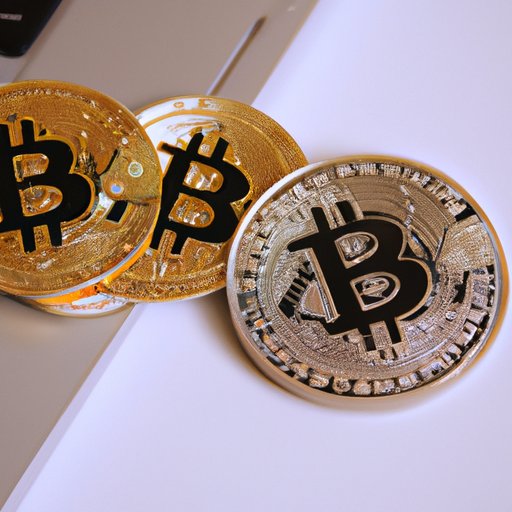Introduction
Bitcoin is a decentralized digital currency that is used to make payments and store value. It was created in 2009 by an anonymous person or group known as Satoshi Nakamoto and has since become one of the most popular cryptocurrencies in the world. In this article, we’ll explore how Bitcoin works for beginners, including its history, use cases, mining and blockchain technology, different types of wallets, benefits, how to buy and store Bitcoin, and regulations and security concerns.
What is Bitcoin?
Bitcoin is a digital currency that is based on a decentralized, distributed ledger system called the blockchain. The blockchain is a public record of all Bitcoin transactions that have ever occurred, which is maintained and verified by a network of computers (known as miners). Transactions are processed and verified by miners, who are rewarded with newly-created bitcoins for their efforts.
Overview of Bitcoin’s History and Use Cases
The first Bitcoin transaction was made in 2009, and since then it has become increasingly popular as a way to make payments and store value. It has been adopted by many individuals, businesses, and governments around the world. Bitcoin is also used as a hedge against inflation and is seen as a safe haven asset in times of economic uncertainty.
In recent years, Bitcoin has gained popularity as a way to pay for goods and services online, and it is now accepted by many retailers and merchants around the world. It has also become a popular investment vehicle for those looking to diversify their portfolio and take advantage of its potential for long-term growth.
Bitcoin Mining & Blockchain Technology
At the heart of Bitcoin is a process called mining. Mining is the process by which transactions are verified and added to the blockchain. Miners use powerful computers to solve complex mathematical equations in order to verify each transaction, and they are rewarded with newly-created bitcoins for their efforts.
The blockchain is the underlying technology that makes Bitcoin possible. It is a public ledger of all Bitcoin transactions that have ever occurred. Each transaction is recorded and verified by miners, and once confirmed, it is added to the blockchain and can never be altered or reversed.
What makes Bitcoin unique is that it is not controlled by any central authority or government. Instead, it is managed by a network of computers spread across the globe, which makes it difficult to manipulate or censor.
Different Types of Bitcoin Wallets
A Bitcoin wallet is a piece of software that stores your Bitcoin balance and allows you to send and receive Bitcoin. There are several different types of wallets available, each with its own advantages and disadvantages.
Hardware Wallets
Hardware wallets are physical devices that store your Bitcoin offline, making them more secure than other types of wallets. They are often used by people who hold large amounts of Bitcoin and want to keep it safe from hackers.
Software Wallets
Software wallets are programs that store your Bitcoin on your computer or mobile device. They are generally less secure than hardware wallets, but they are easier to use and are typically free to download.
Mobile Wallets
Mobile wallets are apps that store your Bitcoin on your smartphone or tablet. These wallets are convenient because they allow you to access your Bitcoin on the go, but they are also less secure than other types of wallets.
Paper Wallets
Paper wallets are pieces of paper that contain your public and private keys. They are used to store large amounts of Bitcoin and are considered to be the most secure type of wallet. However, they are not very user friendly and can be difficult to set up.
Benefits of Using Bitcoin
Bitcoin offers several advantages over traditional payment methods, such as faster transactions, lower transaction fees, greater privacy, and borderless transactions. Here are some of the benefits of using Bitcoin:
Faster Transactions
Bitcoin transactions are usually completed within minutes, compared to days or weeks for traditional payment methods. This makes Bitcoin a great option for online purchases, international payments, and other time-sensitive transactions.
Lower Transaction Fees
Transaction fees for Bitcoin are much lower than those charged by banks and other financial institutions. This makes Bitcoin a cost-effective option for sending and receiving money.
Greater Privacy
Unlike traditional payment methods, Bitcoin does not require users to provide personal information when making a transaction. This makes it an ideal choice for those who value their privacy.
Borderless Transactions
Bitcoin can be used to send and receive money anywhere in the world, regardless of borders or time zones. This makes it a great option for international payments and remittances.

How to Buy and Store Bitcoin
There are several different ways to buy and store Bitcoin. The most common method is to use an exchange, which is an online platform that allows users to buy and sell Bitcoin. Once you have bought Bitcoin, you can store it in a wallet, either on your computer or on a mobile device.
Regulations and Security Concerns
Due to its decentralized nature, Bitcoin is not subject to the same regulatory oversight as other currencies. This means that users must exercise caution when buying and selling Bitcoin and be aware of the risks associated with it. Additionally, Bitcoin is vulnerable to security risks, such as hacking and theft, so users must take steps to protect their funds.
Conclusion
Bitcoin is a decentralized digital currency that is used to make payments and store value. It offers several advantages over traditional payment methods, such as faster transactions, lower transaction fees, greater privacy, and borderless transactions. Bitcoin is mined using powerful computers, and transactions are verified and added to the blockchain. There are several different types of Bitcoin wallets available, and users should consider their security needs when choosing one. Finally, users should be aware of the regulatory and security risks associated with Bitcoin and take steps to protect their funds.
(Note: Is this article not meeting your expectations? Do you have knowledge or insights to share? Unlock new opportunities and expand your reach by joining our authors team. Click Registration to join us and share your expertise with our readers.)
